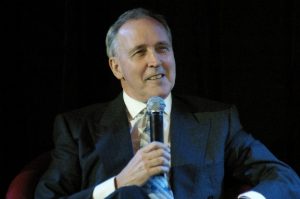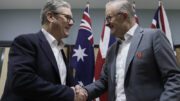It is going to be a hard road to haul to achieve the great Britain of Brexit dreams, writes Geoff Kitney.
In all the discussion about what sort of Britain will emerge at the end of the Brexit process, little attention is given to a fundamental issue – what sort of economic model will Britain need to take it into the lonely world of self-imposed European exile?
So far, the best that Brexiters can offer for economic Britain after 2019 is the confident but vague assertion that prosperity will come from restoring Britain to great trading nation status.
There is an immediate and obvious problem with this: Britain will be working against a rising global tide of protectionism that will make life precarious for any nation seeking prosperity from trade. Multilateral trade liberalisation, which would be the best hope for creating the new trading opportunities that the UK would need post-membership of the European single market, is a lost cause for the foreseeable future.
There is plenty of optimistic talk about bilateral trade deals, but most of this talk glosses over the problems of negotiating them – from the sheer, massive logistical challenges through to the doubts about Britain’s leverage in any such negotiations.
Dig down a bit into these questions and you start to see some very troubling answers.
Apart from the immediate problems of the immensity of the task, there are bigger issues that go to much broader and, in the long term, more fundamental economic challenges.
The populist forces that left [Theresa May] with the mess of Brexit are driving her agenda with little coherence as Britain enters a period of its history for which there is no road map
Britain is heading for a much less certain economic future at a time of much less certainty about the future of economics.
Economic policy around the world is in an increasing state of flux. Long-held orthodox policy prescriptions are being challenged by poor outcomes and increasing doubt.
RECENT HEADLINE: Malcolm Turnbull kills off Tony Abbott’s India free trade deal, for now. Sydney Morning Herald, April 11
Even once passionate advocates of the late 20th century belief that free market liberalisation, privatisation and fight-inflation-first policy settings were the key to future prosperity and happiness are having second thoughts.
One of the countries to adopt such a prescription and to have benefitted from it is Australia. It is about to rack up a record 26 years of continuous economic growth, widely seen as the consequences of radical pro-market reforms and unilateral dismantling of previously high tariff barriers.
 Yet, the person most responsible for bringing about the transformation of what he said at the time was Australia’s “sclerotic” economy – then Treasurer and Money Magazine’s 1984 Finance Minister of the Year, Paul Keating (pictured) – now says that the era of neo-liberal economic reform is “at a dead end”.
Yet, the person most responsible for bringing about the transformation of what he said at the time was Australia’s “sclerotic” economy – then Treasurer and Money Magazine’s 1984 Finance Minister of the Year, Paul Keating (pictured) – now says that the era of neo-liberal economic reform is “at a dead end”.
Keating, now in retirement, said that liberal economic policy introduced in the 1980s had dramatically increased wealth in Australia – as it had wherever it was adopted. In Australia there had been a 50 per cent increase in real wages and a huge lift in personal wealth.
But he said since the global financial crisis (GFC) “liberal economics has gone nowhere”.
“We have a comatose world economy held together by debt and central bank money,” Keating told the Fairfax media late last month. “Liberal economics has no answer to the contemporary malaise.”
Because [Australia] was such a standout example of the success of economic liberalism, it now stands out as a demonstration of how economic policy has lost its way
After defying the growth-sapping aftermath of the GFC and maintaining annual growth rates of more than 3 per cent, Australia’s trend growth is steadily falling. There are fears that a recession will be difficult to avoid in the next few years.
The Australian economy is out of whack. While much of the economy is slowing, public and household debt are at record highs and wages are stagnant, house prices are booming to record levels. Sydney is now the second least affordable city in the world for young home buyers.
The conservative Australian government is relying on conventional liberal economics to try to reboot the economy. It has moved to slash company tax to try to boost investment and create jobs. It talks constantly of cutting the size of government and the burden of government regulation.
But voters appear to have lost faith in the government’s economic management. In the most recent polls the conservatives trail the centre-left Labor Party – which promises a mix of populist re-regulation and redistributive tax and spending measures – by 10 per cent.
In the public policy debating sphere – for decades dominated by free-market think tanks that mushroomed in the 1980s – new groups advocating a more pragmatic policy mix are gaining traction.
Aspects of the previously dominant liberal economic orthodoxy – such as the privatisation of public utilities and assets – are now seen as deeply flawed. Australia’s energy market, which was largely privatised with the sale of monopoly electricity assets, is now in crisis after a disastrous mix of price gouging and under investment.
The energy crisis is part of a bigger mess of climate change policy which has seen Australia slip from being a leader to a laggard amid a fierce backlash from the conservative side of politics and their business supporters to government efforts a decade ago to regulate for a world-leading emissions reduction regime. But leaving it to the free market has been a failure.
Without public policy action, the corporate sector and its political allies have looked to the United States and taken inspiration from the success of climate action denialists who are now in the ascendency under the Trump presidency.
In all these issues related to economic policy, Australia’s increasingly confused agenda reflects growing uncertainty throughout the western world. But because it was such a standout example of the success of economic liberalism, it now stands out as a demonstration of how economic policy has lost its way.
The long economic hangover since the global financial crisis has seen a mish-mash of economic policy approaches being adopted in the major economies.
Populist leaders have made big inroads into western democracies, playing on the public’s loss of faith in policies which have seen huge increases in the gap between top income earners and the rest, and have been inadequate to deal with the disruptive impacts of globalisation and digital automation.
The result in the United States is a President elected on a weird economic agenda of old-style protectionism, Laffer curve inspired voodoo tax policy, dismantling of social programmes and of the regulatory architecture introduced to end the cowboy adventurism of the financial markets and denial of the existence of climate change – and therefore the need for policy to deal with it.
For a display of the confusion and uncertainty now afflicting economic policy debate, the latest French presidential election candidates’ debate laid it all out. Every possible option was on the table, with not a hint of consensus. Who knows what economic policy mix will emerge in France?
In the United Kingdom, Prime Minister Theresa May also appears to be in a state of confusion about what should be her government’s economic policy agenda. The populist forces that left her with the mess of Brexit are driving her agenda with little coherence as Britain enters a period of its history for which there is no road map.
Those who see the better-than-forecast economic indicators in the immediate aftermath of the Brexit vote as offering the promise of a smooth ride to a bright economic future are being brave, at best, and foolhardy, at worst.
Looking at the world into which Britain is about to venture alone, the only honest way to see it is to say it’s going to be a hard road to haul to achieve the great Britain of Brexit dreams.

Headline Image: Credit: Phongphan / Shutterstock
Photo: Paul Keating. Credit: Idpercy.
Used under terms of a Creative Commons license




